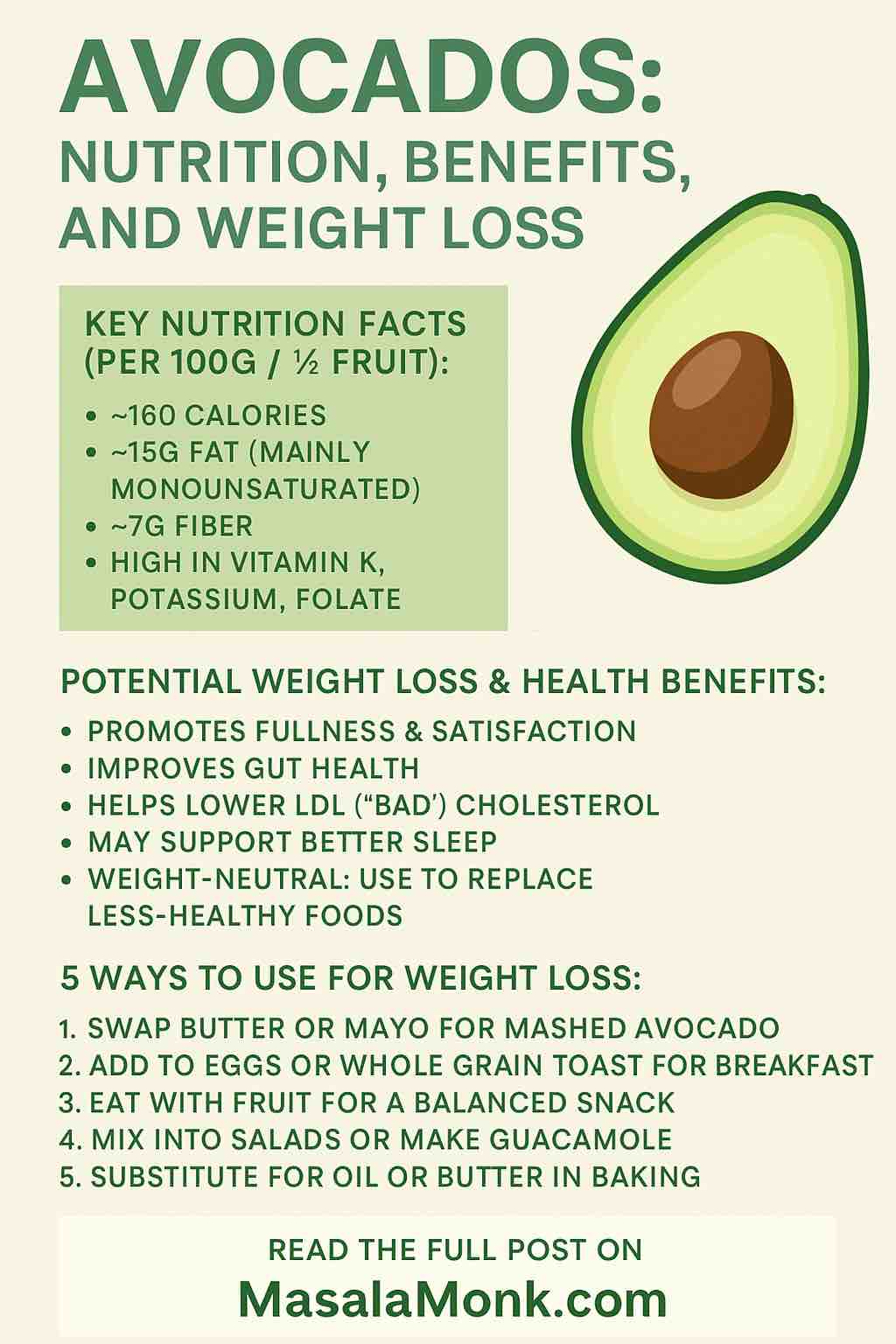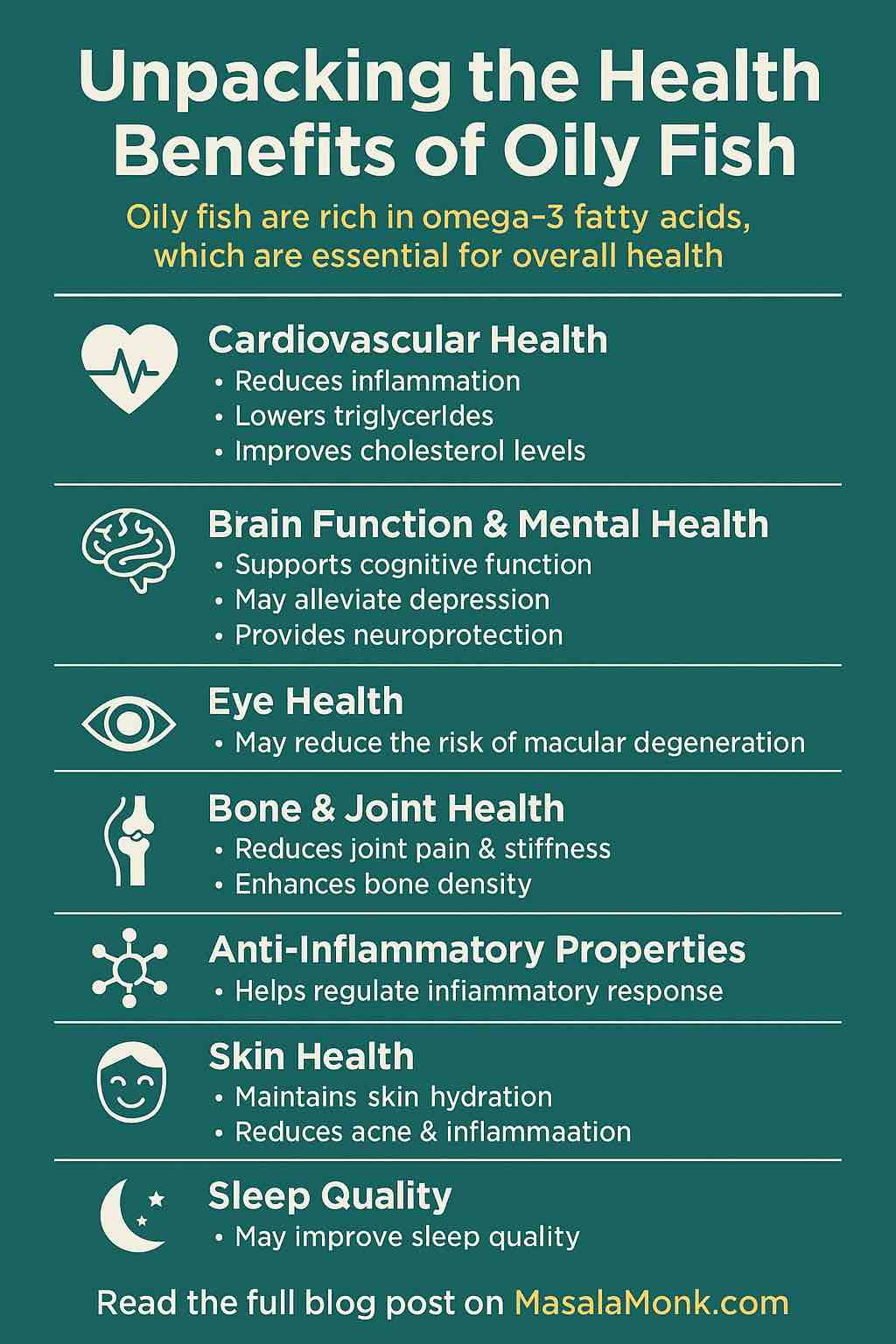
There are few foods as beloved—and as scientifically intriguing—as the humble avocado. Once considered a trendy “superfood,” this creamy green fruit is now a staple in kitchens worldwide. But what does the latest science say about avocados, health, and weight loss? Do they actually help you lose weight, or are their powers overhyped? Let’s go deeper.
Section 1: The Avocado—A Nutritional Powerhouse
Avocados aren’t your average fruit. While apples and oranges are high in carbs and natural sugars, avocados deliver healthy fats, fiber, and a spectrum of essential nutrients:
What’s In an Avocado? (per 100g / ~half a medium fruit):
- Calories: ~160 kcal
- Fat: 15g (most is monounsaturated, like olive oil’s heart-healthy oleic acid)
- Carbs: 9g (but 7g is fiber—so net carbs are very low)
- Protein: 2g
- Vitamins: K, E, C, B5, B6, Folate
- Minerals: Potassium (even more than bananas!), magnesium, copper
- Phytonutrients: Lutein & zeaxanthin for your eyes
Bottom line:
Avocados are nutrient-dense, low in sugar, and loaded with fiber and good fats.
Section 2: Health Benefits—What Does the Latest Science (2025) Show?
1. Fullness & Weight Management
- The unique combo of fiber and monounsaturated fat keeps you full for hours, reducing the urge to snack.
- Clinical trials show meals with avocado increase satiety, often leading to fewer calories eaten later in the day.
2. Gut & Microbiome Health
- Recent research (2025, multi-month RCT) found that eating avocado daily increases beneficial gut bacteria and overall microbial diversity—good for digestion, immunity, and possibly even mood.
3. Heart & Metabolic Health
- Large-scale studies link regular avocado consumption to lower LDL (“bad”) cholesterol, higher HDL, and better blood pressure—thanks to its fiber, potassium, and healthy fats.
- Substituting carbs with avocado in meals trends toward better blood sugar and reduced inflammation.
4. Sleep Quality (Brand-New Discovery)
- A 2025 clinical trial (969 adults!) found that eating an avocado daily improved sleep duration and quality, even among those struggling with abdominal weight.
- Better sleep can indirectly support weight loss by reducing cravings and stabilizing appetite hormones.
5. Body Weight: Realistic Expectations
- Here’s the truth: Avocados aren’t “fat-burning” by themselves.
- Studies show they’re “weight-neutral”—you won’t lose fat by adding them to a junk-food diet, but using avocado to replace less healthy foods can help with overall weight management and metabolic health.
Section 3: Practical Cautions
- Calorie Density: One avocado = ~240 calories. Not a reason to avoid them, but portion control matters if you’re watching calories.
- Vitamin K: High levels may interfere with blood thinners—if you’re on medication, talk to your doctor.
Section 4: 5 Practical Ways to Use Avocado for Weight Loss
1. Swap for Spreads
Replace butter, mayo, or cream cheese with mashed avocado on toast or sandwiches. You’ll save calories, increase fiber, and feel fuller.
2. The Satisfying Breakfast
Add half an avocado to scrambled eggs or on whole grain toast. The fat + fiber combo keeps hunger away all morning.
3. Smarter Snacks
Try avocado with a little salt and lemon, or pair slices with apple or pineapple. Balanced, filling, and won’t spike blood sugar.
4. Upgrade Your Salads
Toss diced avocado into your salads, or blend it into creamy, homemade dressings. You’ll increase fiber and actually absorb more nutrients from your veggies.
5. Bake & Blend
Swap butter or oil for mashed avocado in recipes (like muffins or brownies) for moisture and nutrition—without sacrificing flavor. Or add to smoothies for creaminess.
Section 5: Tips for Success (Backed by Science)
- Replace, Don’t Add: Avocados work best when they take the place of less healthy fats or carbs, not just as an extra.
- Stick to ½–1 Avocado a Day: More isn’t better; balance is key.
- Pair with Protein: For extra staying power, combine avocado with eggs, chicken, fish, or beans.
- Embrace the Variety: Try avocado toast, guac, salads, sushi, smoothies, even desserts!
Conclusion
Avocados are more than a trend—they’re a research-backed superfood that can support a healthy lifestyle, better sleep, gut health, and more. While they’re not a “miracle weight loss food,” practical use can help you eat better, feel satisfied, and reach your goals.
Give avocado a central role in your kitchen—your body (and maybe your sleep) will thank you!
🥑 Avocado FAQ: 10 Common Questions Answered
- Q: Can I eat avocado every day?
A: Yes! Most studies use ½ to 1 avocado daily. This amount is safe and beneficial for most people, supporting heart, gut, and even sleep health. - Q: Will eating avocado make me gain weight?
A: Not if you watch your portions. Avocados are calorie-dense, so use them to replace less healthy fats or snacks—not as an “add-on”—to help with weight management. - Q: Is avocado keto-friendly or low-carb?
A: Absolutely. Avocados are very low in net carbs and high in healthy fat and fiber, making them perfect for keto and low-carb diets. - Q: Are there any people who should avoid avocados?
A: If you take blood thinners (like warfarin), consult your doctor—avocado is high in vitamin K. Also, rare allergies exist. - Q: Can avocado really improve sleep?
A: Yes! A 2025 clinical trial found daily avocado intake improved sleep duration and quality, possibly due to its healthy fats and magnesium. - Q: What’s the healthiest way to eat avocado?
A: Raw or minimally processed—on toast, in salads, as guacamole, or blended in smoothies. Heating is fine but keep added sugars and oils low. - Q: How do I store an avocado to keep it fresh?
A: Store ripe, uncut avocados in the fridge. Once cut, sprinkle with lemon or lime juice, cover tightly, and refrigerate to slow browning. - Q: Is avocado good for cholesterol and heart health?
A: Yes. Avocado’s monounsaturated fats and fiber help lower LDL (“bad”) cholesterol and support healthy blood pressure. - Q: How can avocado help with weight loss?
A: Its high fiber and healthy fat promote fullness and satisfaction, which can reduce snacking and overall calorie intake when used in place of more processed foods. - Q: What’s the best portion size for weight loss?
A: ½ to 1 medium avocado per day is ideal. This gives health benefits without excess calories, especially if you use it as a swap for higher-calorie spreads or snacks.













